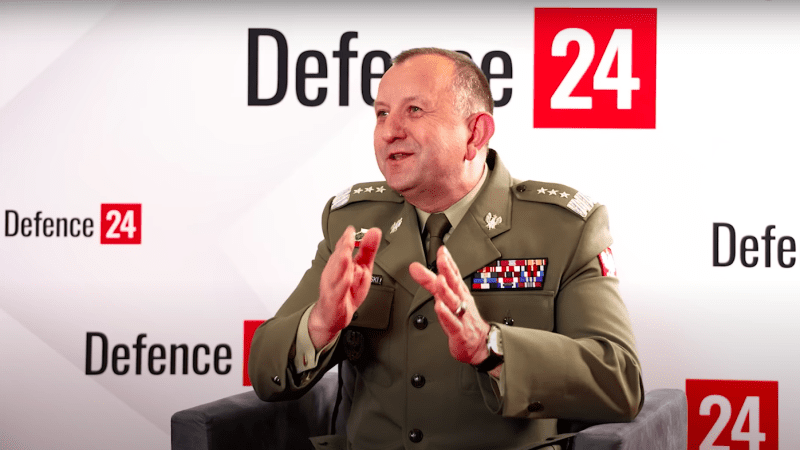Polish General to Lead the Eurocorps. Transfer of the Ukrainian Lessons-Learned?

General Jarosław Gromadziński is now leading the Eurocorps - as the first Polish officer in history. The Eurocorps is playing an increasingly significant role in the NATO collective defence scheme. General Gromadziński may make major contributions to the way the Eurocorps would operate, as recently he was working as a commander of a multi-national group coordinating support for Ukraine.
Gromadziński took over the command of the Eurocorps after Belgian General Peter Devegoleare, in Strasburg. The ceremony involved the head of the Polish Ministry of Defence, Mariusz Błaszczak, as well as his Belgian, French, Luxembourgian, and Spanish counterparts, along with the Deputy Chief General Inspector of Bundeswehr, Lt. Gen. Markus Laubenthal, who, between 2014 and 2017, was the first German Chief of the US Army Europe staff.
That lineup was not selected by accident. Belgium, France, Germany, Luxembourg, and Poland are the Eurocorps' framework nations. Warsaw joined that group in early 2022. Apart from these, supporting nations as follows are also a part of the structure: Austria, Greece, Italy, Romania, and Turkey.
The ceremony took place in special circumstances. For a few years now, Eurocorps has been striving to maintain parallel collective defence capabilities within the NATO framework, and crisis response capabilities, both within the framework of NATO, and the EU. In 2020 Eurocorps was leading the NATO Response Force, and command certification for the NATO Joint Task Force HQ is expected to be granted in late 2023.
From the Polish point of view, the aforesaid process is overshadowed by the full-scale war in Ukraine. And this is where Gromadziński may make unique contributions, with his unique experience. For 8 months, starting in August 2022, he was the deputy commander of the Security Assistance Group-Ukraine (SAG-U), an international unit coordinating the military aid granted to Ukraine by 50 nations.
The military aid for Ukraine and the related experiences remain multi-faceted. The full-scale conflict operations can be found at the top of the list. Support for Kyiv also involved the establishment of interoperability, and handling of the logistics and supply chains for multiple partially-compliant weapons systems, as well as broad training efforts undertaken at different levels. All of the above is happening within structures of militaries of different national origins, in a variety of languages, and with a lot of pressure imposed by time constraints.
The said experience is priceless and can be used in many domains, not just the ones directly tied to operations of high intensity. There is no doubt that both the necessity to support Ukraine, reinforce the NATO eastern flank, and the peacekeeping operations as well, all require a high degree of involvement and are also burdensome for the relevant NATO, EU, and national structures within the EU member states. Thus, it remains important to seek synergy (as it happens in case of the Eurocorps), not redundancy.
Throughout the period between being the Deputy SAG-U commander, and being the Eurocorps Commander, Gromadziński was the General Council of the Polish Military. Before that, between 2018-2022 he had been the commander of the newly-formed 18th Mechanized Division. During that period, the newly established unit command first became responsible for coordinating the operations on the eastern border, and later on, following the full-scale Russian aggression in Ukraine, for conducting joint operations with US units deployed to eastern Poland. In 2021 the Division command was certified in compliance with the NATO standards (CREVAL).
Earlier on Gromadziński was working as the Deputy Commander of the 12th Mechanized Division, from May 2016 until July 2018 he was commanding the 15th "Giżycka" Mechanized Brigade. When commanded by Gromadziński, the 15th "Giżycka" Mechanized Brigade was integrated with the US-led NATO battle group, and deployed to North-Eastern Poland, based on a decision made during the NATO summit in Warsaw in 2016.
Earlier on Gromadziński had been serving at the General Staff, as the head of the 16th Mechanized Division operational unit, and as the chief of staff and commander of the mechanized battalion of the 9th Armored Cavalry Brigade based in Braniewo. He deployed to Afghanistan twice, he also took part in the UN mission to Syria, where back in 2007 he was commanding the UN Mission's military detachment. He has been serving in the military since 1990. He is a graduate of the National Defence University and the General Tadeusz Kościuszko Military University of Land Forces (including the post-graduate programme in defence policy) and also has a Ph.D. degree in social sciences. He also completed numerous training courses organized by NATO, including a high command course at the Baltic Defence College in Estonia.
Eurocorps
Eurocorps is an international military structure that has been established in 1992. The assumption behind it stemmed from Germany and France willing to create a multinational corps-level unit (in essence, its command), capable of commanding multinational operations at the corps level (several divisions). Back in 1993, a decision was made to ready the Eurocorps to be subordinated to SACEUR. The Eurocorps structure is open to the EU and NATO states.
The Eurocorps has been a part of the NATO missions in the Balkans (in 2000 commanding the KFOR elements in Kosovo), and in Afghanistan (2004-2005), it also supported the Afghan mission in 2012. The structure also played a key role in two EU training missions, in Mali, in 2015, and 2022, in the Central African Republic. Even though the structure of the Eurocorps has been designed primarily with the peacekeeping operations in mind, recently the aforesaid body has been tightening its ties with NATO, to establish a capability to conduct a full spectrum of operations, from peacekeeping (within both EU, as well as NATO frameworks) up to high-intensity scenarios.
In 2020 Eurocorps was leading the NATO Response Force, and command certification for the NATO Joint Task Force HQ is expected to be granted in late 2023. It is assumed that in the future the Eurocorps would obtain the capability to act as a command element in high-intensity scenarios (Warfighting Corps HQ), commanding detachments composed of up to five Divisions, 120 thousand troops in total. Belgium, France, Germany, Luxembourg, and Poland are the Eurocorps' framework nations. Warsaw joined that group in early 2022. Apart from these, supporting nations as follows are also a part of the structure: Austria, Greece, Italy, Romania, and Turkey.

WIDEO: Defence24 Days 2025: Premier Defence & Security Conference in CEE